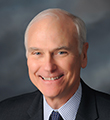Kansas Legislative Insights Newsletter | February 2, 2018
Once in a Blue Moon
Is being sworn in as governor on the same day as a full eclipse of a “blue moon” (second full moon in the same month) a good or bad omen? Dr. Jeff, now Governor, Colyer will soon find out. That full eclipse took place shortly before 7 a.m. on Wednesday morning, and Colyer was sworn in as governor at just past 3 p.m. that afternoon.
The new governor inherits a much more stable revenue situation than was the case over the past two years. Sales and income tax receipts for the State General Fund (SGF) have exceeded estimates for several months now, and tax revenues for January exceeded expectations by $163 million. The dramatic increase this month was due mostly to early filings by taxpayers wanting to put themselves in the best position possible with the new federal tax act.
In his remarks after taking the oath of office, Governor Colyer did not reveal any big policy plans for the remainder of this year but did pledge to work on solving the school finance stalemate as soon as possible. This morning he announced four cabinet changes as well as numerous staff appointments. The most prominent change involved Nick Jordan, who served for several years as Secretary of Revenue and interim Secretary of Commerce under former governor Sam Brownback. Governor Colyer will be delivering a quasi-State of the State address to a joint session of the legislature next Wednesday where he will undoubtedly discuss numerous policy recommendations.
The governor did meet with the Republican and Democrat leaders of the House and Senate yesterday but did not discuss specific legislation with them, nor did he reveal the names of people he is considering to fill the now vacant office of Lt. Governor. He indicated there is no rush to do so and that appointment may not occur for weeks.
A Very Deliberate Pace
Four weeks of the 2018 legislative session have come and gone and meaningful actions have been few and far between. Slow starts are not uncommon for legislative sessions, but this session has been unusually slow. There have been a few mostly non-controversial bills passed by at least one house, but major issues or big budget decisions are still languishing in committee.
Kansans should expect more of the same until there is some movement on the mother of all controversial issues - school finance. The disagreements on the subject among legislators and the differences between legislators, the State Board of Education, and the Kansas Supreme Court show no signs of abating. More problems arose last week when a post audit report showed that tens of millions of state dollars have been granted for many years to several of the state’s largest school districts without any statutory authority to do so. This revelation will only slow the process of finding a workable solution even further.
Legislators certainly have plenty of other issues to debate and vote on such as firearms control, Medicaid (KanCare) eligibility, economic development programs, state water plans, workers compensation, etc., but any legislation that has a significant price tag will not see much movement until a bill or resolution on school finance has been presented to the governor.
Deadlines for school finance studies to be completed and legislation to be drafted are rapidly approaching, but there are few, if any, public signs of progress on this all-consuming issue. The Supreme Court has threatened, as it has in the past, to close down schools if the legislature doesn’t present a constitutional funding plan by the end of June.
Bill Summaries
Bills have been pouring in this week as the first major deadline for bill introductions is a week from today (Friday, February 9th). Listed below are selected committee bills and bills sponsored by individuals that were introduced this week. Additional information on any of these bills can be accessed by clicking on the bill number.
AGRIBUSINESS
SB 337 – Requires operators of a chicken facility to obtain a federal permit if 125,000 or more broilers or 82,000 or more laying hens are confined. (Referred to the Senate Committee on Agriculture and Natural Resources, Senator Dan Kerschen, chair)
SB 344 – Creates the Noxious Weed Act which empowers the Kansas Secretary of Agriculture to make an emergency declaration of noxious weeds in certain situations. Establishes an 11-member noxious weed advisory committee with enumerated powers and duties. Makes it unlawful to knowingly sell or transport noxious weeds. Once a noxious weed is identified, it is declared to be a noxious weed in all counties. Specifies the powers and duties of county commissions to carry out the various provisions of the act. (Referred to the Senate Committee on Agriculture and Natural Resources, Senator Dan Kerschen, chair)
HB 2482 – Amends the period of time when the sale of alcoholic liquor is prohibited in any public venue, club, or drinking establishment to be from 2:00 a.m. to 6:00 a.m. Currently that period is from 2:00 a.m. to 9 a.m. (Passed by the House on a vote of 75-47. Referred to the Senate Committee on Federal and State Affairs, Senator Bud Estes, chair)
HB 2552 – Sets a maximum of twenty and a minimum of five first-year veterinary students who can enter the veterinary training program for rural Kansas each year. (Referred to the House Committee on Agriculture, Rep. Kyle Hoffman, chair)
HB 2583 – Same provisions as SB 344. (See above) (Referred to the House Committee on Agriculture, Rep. Kyle Hoffman, chair)
BUSINESS
SB 334 – Allows for a limited carry forward of tax credits received under the High Performance Incentive Program (HPIP). No such credits can be revived if they expired prior to January 1, 2018. (Referred to the Senate Committee on Commerce, Senator Julia Lynn, chair)
HB 2545 – Amends the Kansas Expanded Lottery Act to allow for a vote on allowing electronic gaming machines at horse and greyhound racetracks in certain counties. Also expands the state debtor setoff program. (Referred to the House Committee on Federal and State Affairs, Rep. John Barker, chair)
ENERGY
HB 2564 – Empowers the Chief Engineer in the Department of Agriculture’s Division of Water Resources to halt, in certain circumstances, the use of “end guns” on center pivot irrigation systems. (Referred to the House Committee on Water and Environment, Rep. Tom Sloan, chair)
FINANCIAL SERVICES
SB 335 – Brings state savings and loan associations and savings banks under the state banking code and repeals the savings and loan code. Grants specified powers to mutual state banks and to the service corporation of a savings and loan association. (Referred to the Senate Committee on Financial Institutions and Insurance, Senator Jeff Longbine, chair)
HB 2580 – Prohibits a consumer reporting agency from charging a fee “for placing, temporarily lifting or removing each security freeze.” (Referred to the House Committee on Judiciary, Rep. Blaine Finch, chair)
HEALTH CARE
SB 338 – The bill would enact a definition of “surgical technologist” based upon a 19-point description of the term “surgical technologist.” In common parlance, the bill is referring to surgical support personnel commonly known as scrubs, operating room technicians, and the like. The bill provides that a hospital or ambulatory care facility should not employ a surgical technologist unless the prospective employee has completed or participated in an acceptable training program. The State Board of Healing Arts is directed to adopt appropriate rules and regulations in order to implement the law. (Referred to the Senate Committee on Public Health and Welfare, Senator Vicki Schmidt, chair)
SB 332 – The bill would amend and repeal sections of K.S.A. Article 39. The bill would impose duties on the Secretary of the Kansas Department for Aging and Disability Services in delegating responsibilities for the developmentally disabled to “community services providers,” as defined in the bill. (Referred to the Senate Committee on Public Health and Welfare, Senator Vicki Schmidt, chair)
HB 2549 – The bill would repeal certain sections of K.S.A. Article 22 and concerns mental health services, competency determinations, and commitment. The bill refers to the Larned State Hospital and Osawatomie State Hospital catchment areas previously defined by counties proximate to such hospitals. (Withdrawn from the House Judiciary Committee; Referred to the House Committee on Health and Human Services, Rep. Daniel Hawkins, chair)
HB 2590 – The bill would require the Secretary of the Kansas Department for Aging and Disability Services (KDADS) to provide oversight and monitoring on the State Long-Term Care Ombudsman Program and its activities. An ombudsman is an advocate for residents of nursing homes, care homes, and assisted living facilities who is trained to resolve problems. The monitoring would include an assessment of how the program is performing its functions, responsibilities, and duties set out in state and federal regulations. The bill would provide additional detail regarding what constitutes “conflict of interest” and the inclusion and definition of “residential representative.” The bill contains additional requirements surrounding ineligibility for appointment to, or to hold the office of, the State Long-Term Care Ombudsman, as well as required experience to be eligible for appointment as the long-term care ombudsman. The bill would also require the review and maintenance of the statewide system that collects and analyzes information and complaints. (Referred to the House Committee on Health and Human Services—Rep. Daniel Hawkins, chair)
HB 2592 – The bill would amend K.S.A. 2017 Supp 39-968 and its rules regarding the State’s Client Assessment, Referral and Evaluation (CARE) program. The CARE program is administered by the Secretary for Aging and Disability Services. (Referred to the House Committee on Appropriations, Rep. Troy Waymaster, chair)
Sub. SB 195 – The bill is a carryover from the 2017 session and would amend current laws by establishing a suspended eligibility status for some Medicaid recipients. Recipients of Medicaid services would be granted suspended eligibility status upon admission to certain institutions. (The Senate Committee on Public Health and Welfare, Sen. Vicki Schmidt, chair, has recommended passage of the bill.)
SB 282 – The bill would amend the state’s Uniform Controlled Substances Act by adding and updating drugs contained in Schedules II and III. The bill also amends Schedule I, which includes drugs that are illegal to possess and may have an effect on local and state prosecutors, law enforcement, and the Department of Corrections. (The Senate Committee on Public Health and Welfare, Sen. Vicki Schmidt, chair, has recommended the bill be passed as amended.)
SB 351 – The bill would amend the Kansas Insurance Code to strengthen regulation of pharmacy benefit managers. (Referred to Senate Committee on Public Health and Welfare, Sen. Vicki Schmidt, chair)
SB 358 – The bill would create the massage therapist licensure act, providing for the regulation and licensing of massage therapists. (Assigned to the Senate Committee on Public Health and Welfare, Sen. Vicki Schmidt, Chair) (See also HB 2557, a companion bill – referred to the House Committee on Health and Human Services, Rep. Daniel Hawkins, chair)
HB 2574 – The bill would amend K.S.A. 2017 Supp. 65-1685 and repeal the existing sections so as to further tighten the state’s Prescription Monitoring Program (PMP). The PMP is intended as a tool for the reduction of prescription drug abuse by providing for the collection, monitoring, and analysis of electronically submitted prescription and dispensing data from providers and pharmacists. (Referred to the House Committee on Health and Human Services, Rep. Daniel Hawkins, chair)
HB 2573 – The bill would direct the Secretary of Health and Environment to investigate and make a study of “maternal death,” meaning the death of any woman from any cause while pregnant or within one calendar year of the end of any pregnancy. (Referred to the House Committee on Health and Human Services, Rep. Daniel Hawkins, chair)
HB 2589 – The bill would amend multiple provisions of Article 65 as they relate to the independent practice of midwifery. It also would establish a nurse-midwives advisory council. (Referred to the House Committee on Health and Human Services, Rep. Daniel Hawkins, chair)
HB 2591 – The bill would impose planning obligations on the Secretary of Health and Environment and the Secretary for Aging and Disability Services through 2021 regarding administration of Kansas Medicaid services. (Referred to the House Committee on Health and Human Services, Rep. Daniel Hawkins, chair)
INSURANCE
SB 267 – The bill would update the statutorily referenced risk-based capital instructions promulgated by the National Association of Insurance Commissioners as of December 31, 2017. Current law references instructions promulgated as of December 31, 2016. The risk-based capital instructions ensure that each domestic insurance company has the minimum amount of capital to support overall business operations. (Passed by the Senate and referred to the House Committee on Insurance, Sen. Jene Vickery, chair)
SB 348 – The bill would amend the Electronic Notices and Documents Act of the Kansas Insurance Code to provide that a health plan may, without prior consent, utilize electronic delivery as its standard method to send the explanation of benefits and policy, including federally required summary of benefit and coverage documents, to a party, so long as printed documents are readily available, but if a party notifies the plan that he or she wishes to receive paper documents via U.S. mail, the plan must comply. Confusingly, the bill excludes application of the limitations of K.S.A. 2017 Supp. 40-5804 to electronic delivery. (Referred to the Senate Committee on Financial Institutions and Insurance, Sen. Jeff Longbine, chair)
TAXES
HB 2569 – Doubles the standard deduction amount for tax year 2018 and beyond for single individual status, married couples status, or head of household status. (Referred to the House Committee on Taxation, Rep. Steve Johnson, chair)
HB 2572 – Creates a ten-member joint legislative committee on “taxpayer transparency” with the power to introduce legislation. Requires the State Board of Tax Appeals (BOTA) to prepare annual reports on the issuance of revenue bonds and property tax exemptions. Also requires the Secretary of Commerce to issue annual reports relating to
HB 2585 – Amends the sales and compensating use tax statutes to require that the retail sale of motor vehicles, with certain exceptions, “shall be sourced to the location of the address of the purchaser.” (Referred to the House Committee on Taxation, Rep. Steve Johnson, chair)
TELECOMMUNICATIONS
HB 2563 – Creates the Rural Broadband Deployment and Maintenance Account in the Kansas Universal Service Fund (KUSF) and specifies what expenditures can be made from that account. Requires certain contributions from advanced telecommunications providers and places a ceiling on distributions for specific telecommunications providers. (Referred to the House Committee on Energy, Utilities and Telecommunications, Rep. Joe Seiwert, chair)
WORKERS COMPENSATION
SB 339 – Provides for significant increases in death benefits and funeral expenses under the workers compensation act. (Referred to the Senate Committee on Commerce, Senator Julia Lynn, chair)
HB 2544 – Reduces benefit payments for permanent disability under the workers compensation act if the employee is receiving retirement benefits under the federal Social Security Act. (Referred to the House Committee on Commerce, Labor and Economic Development, Rep. Les Mason, chair)
Kansas Legislative Insights is a publication developed by the Governmental Relations & Public Policy Law practice group of Foulston Siefkin LLP. It is designed to inform business executives, human resources and governmental relations professionals, and general counsel about current developments occurring in current Kansas legislation. Published regularly during the Kansas legislative session, it focuses on issues involving health care, insurance, public finance, taxation, financial institutions, business & economic development, energy, real estate & construction, environmental, agribusiness, employment, and workers compensation. Bill summaries are by necessity brief, however, for additional information on any issue before the Kansas Legislature, contact Foulston Siefkin’s Governmental Relations & Public Policy Law practice group leader, James P. Rankin at 785.233.3600 or jrankin@foulston.com.
Kansas Legislative Insights Editors
 |
Jim Maag jmaag1@cox.net 785.806.3472 |
 |
James P. Rankin jrankin@foulston.com | View Bio 785.233.3600 |
Jim Maag and James P. "Jim" Rankin are co-editors of Foulston Siefkin’s Kansas Legislative Insights. Jim Maag, a non-lawyer Governmental Affairs Consultant to Foulston Siefkin’s Governmental Relations & Public Policy Practice Group, provides legislative monitoring and lobbying services for our governmental relations clients. Mr. Maag has had a distinguished career in governmental matters and banking, most recently serving as President of the Kansas Bankers Association. He has been involved in the Kansas legislative process for more than four decades as a legislator, administrator or lobbyist. As a partner at Foulston Siefkin, Mr. Rankin's practice focuses on employee benefits law relating to public, private, governmental, and tax-exempt organizations. A large part of his work involves insurance regulatory and compliance issues in many industries, including health care. Mr. Rankin has been selected by peers for inclusion in The Best Lawyers in America® and the Missouri & Kansas Super Lawyers® list. He is the firm's representative with State Law Resources, Inc., a national network of independent law firms selected for their expertise in administrative, regulatory, and government relations at the state and federal level.
This update has been prepared by Foulston Siefkin LLP for informational purposes only. It is not a legal opinion; it does not provide legal advice for any purpose; and it neither creates nor constitutes evidence of an attorney-client relationship.





